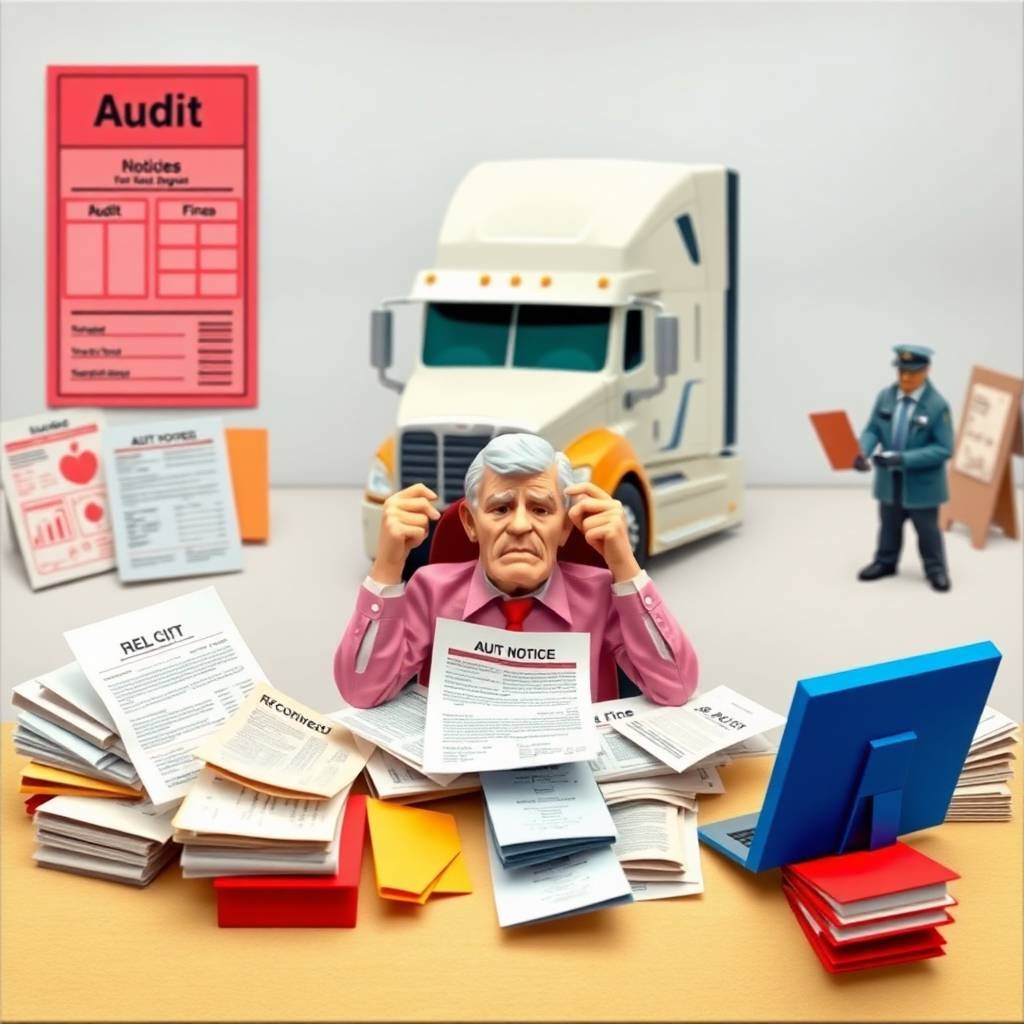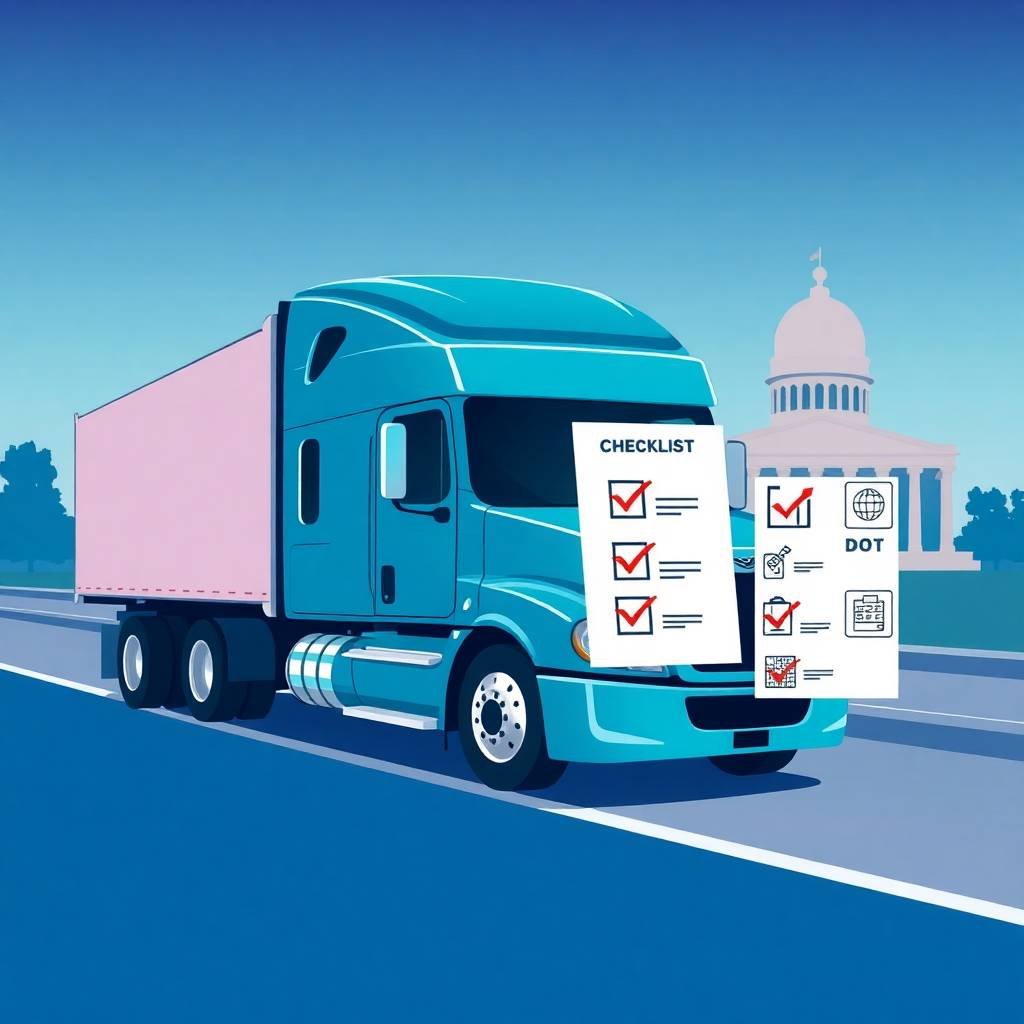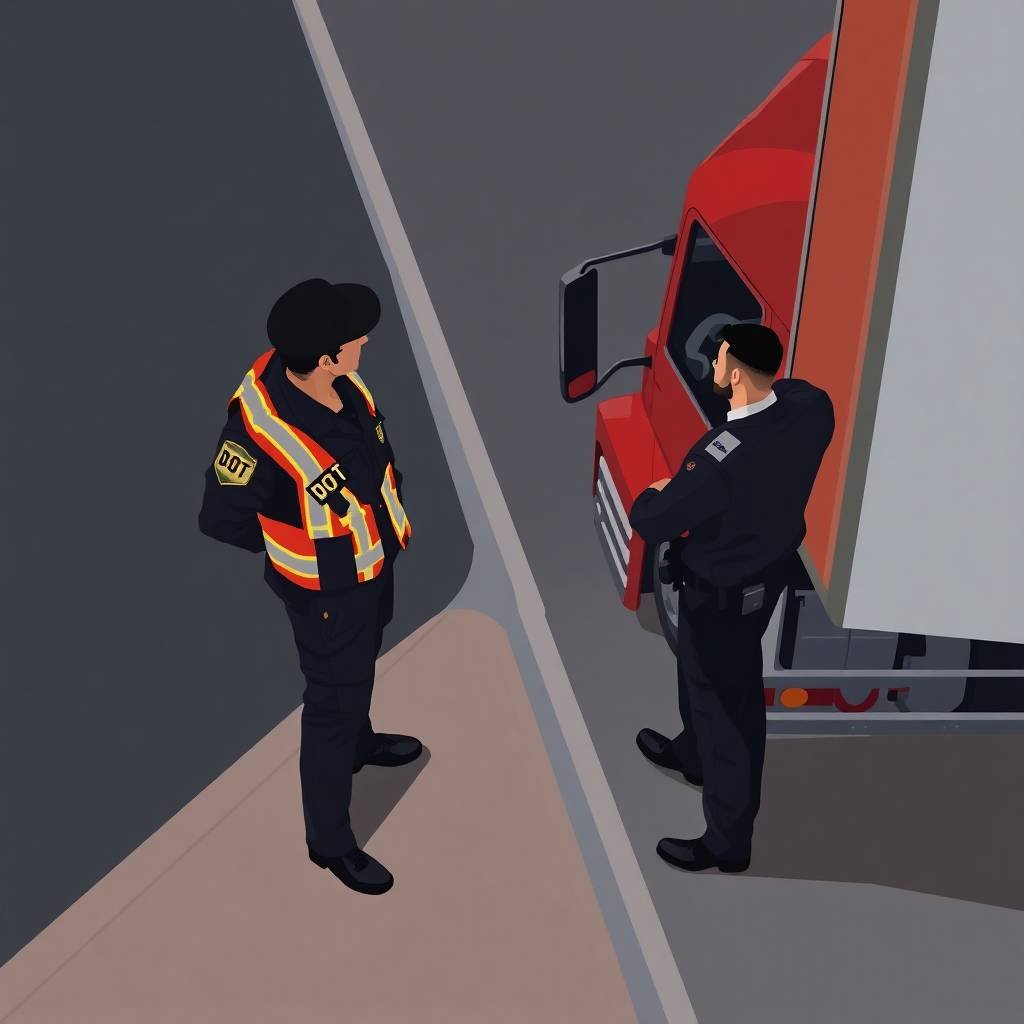1. Understanding the Importance of DOT Compliance for Owner-Operators
For owner-operators, staying compliant with Department of Transportation (DOT) regulations is critical. Navigating the complexities of DOT requirements ensures not only your operational legitimacy but also the safety of your business and others on the road. The “DOT Compliance Checklist for Owner Operators” is a vital resource for meeting these standards effectively.
Why DOT Compliance Matters
The DOT enforces strict guidelines to uphold safety and efficiency in the transportation industry. Failing to adhere to these regulations can result in fines, suspension of operations, and damage to your reputation. To safeguard your business, it’s essential to follow the DOT Compliance Checklist for Owner Operators, which includes maintaining accurate records, ensuring vehicle safety, and adhering to driver qualification standards.
For detailed guidance, the FMCSA website and Department of Transportation provide extensive resources.
Key Elements of the DOT Compliance Checklist for Owner Operators
Driver Qualification Files (DQ Files)
Maintaining up-to-date and accurate driver qualification files is essential. This includes verifying driver credentials, completing background checks, and conducting regular performance reviews. Learn more about driver qualification file requirements and common DQ file violations.
If you need professional support, our DQ file setup and monitoring services can help streamline compliance.
Drug and Alcohol Testing Compliance
The FMCSA mandates pre-employment and random drug and alcohol testing to ensure drivers are fit for duty. Understand the pre-employment drug testing requirements and manage your program effectively with our drug and alcohol testing management services.
For a deeper dive into compliance, visit our pages on random drug testing requirements and the driver drug and alcohol testing program.
Vehicle Maintenance and Inspection
Regular inspections and maintenance are critical to meeting DOT standards. Ensure your vehicles are road-ready by following the guidelines in the DOT Compliance Checklist. Proper documentation is essential for DOT audits, and our DOT audit preparation services are designed to help you stay prepared.
Avoiding Common FMCSA Compliance Mistakes
Many owner-operators face challenges in maintaining compliance due to oversight or lack of resources. Common pitfalls include failing to monitor hours-of-service, neglecting vehicle maintenance, or incomplete DQ files. Avoid these issues by reviewing our guide on FMCSA compliance mistakes and understanding FMCSA compliance requirements.
Leverage Professional Services
Navigating DOT compliance can be daunting, but expert assistance is available. Explore our full range of FMCSA compliance services for owner-operators and FMCSA compliance help for trucking companies.
From UCR filing assistance to IFTA, IRP, and BOC-3 support, we provide solutions tailored to owner-operators. Scheduling a consultation is easy; book a 30-minute appointment today to discuss your compliance needs.
Stay Updated with Industry Trends
Keeping up with changes in DOT and FMCSA regulations is crucial. Regularly visit our blog for insights on topics like FMCSA Clearinghouse compliance and FMCSA Safety Measurement System updates.
Legal and Privacy Considerations
When working with compliance services, ensure transparency by reviewing our Disclaimer, Privacy Policy, and Terms of Service.
In conclusion, adhering to the DOT Compliance Checklist for Owner Operators is vital for ensuring your business runs smoothly and safely. Leverage available resources and expert services to stay ahead in this competitive industry.

2. DOT Compliance Checklist for Owner Operators: What It Covers and Why It Matters
Staying on top of DOT compliance is a critical responsibility for owner-operators in the trucking industry. Following a comprehensive DOT Compliance Checklist for Owner Operators ensures the safety, legality, and efficiency of your operations. This article delves into the essential elements of the checklist and why it’s crucial for every owner-operator to comply with these regulations.
Key Components of the DOT Compliance Checklist for Owner Operators
Driver Qualification Files (DQ Files)
Driver qualification files are a foundational part of the DOT Compliance Checklist for Owner Operators. These files contain vital records, such as driving licenses, medical certifications, and employment history. Ensuring your DQ files are accurate and complete helps avoid fines and penalties. Learn more about driver qualification file requirements and common DQ file violations.
If managing these files feels overwhelming, our DQ file setup and monitoring services can streamline the process.
Drug and Alcohol Testing Compliance
Drug and alcohol testing is another critical aspect of compliance. Owner-operators must adhere to the FMCSA’s stringent guidelines for pre-employment and random testing. This ensures driver safety and public trust. Explore pre-employment testing requirements and random testing protocols to stay compliant.
For assistance, check out our drug and alcohol testing management services.
Hours-of-Service and Vehicle Maintenance
Adhering to hours-of-service regulations and ensuring vehicles are well-maintained are vital steps in the DOT Compliance Checklist for Owner Operators. Regular inspections and accurate logs prevent operational disruptions. For comprehensive guidance, visit the FMCSA website or our detailed DOT Compliance Checklist.
Audit Preparation
DOT audits can be daunting. Being prepared is essential for passing them without issues. Familiarize yourself with DOT audit preparation tips and consider leveraging our DOT audit preparation services.
Why DOT Compliance Matters
Non-compliance can result in hefty fines, operational shutdowns, and damage to your business’s reputation. Adhering to the DOT Compliance Checklist for Owner Operators mitigates these risks and enhances safety on the roads. For more insights on common pitfalls, review FMCSA compliance mistakes.
Resources for Owner-Operators
To navigate DOT compliance effectively, leverage professional support and educational resources. Explore our FMCSA compliance services for owner-operators and IFTA, IRP, and BOC-3 support. For regular updates, visit our blog or schedule a consultation.
Additional Legal and Policy Considerations
Understanding the legal framework behind compliance is essential. Review our Disclaimer, Privacy Policy, and Terms of Service for transparency.
In conclusion, the DOT Compliance Checklist for Owner Operators is more than a regulatory requirement—it’s a roadmap to safety, efficiency, and professionalism in the trucking industry. Stay informed and compliant to ensure the longevity and success of your operations.

3. Driver Qualification Files: Your First Line of Compliance Defense
For owner-operators in the trucking industry, maintaining compliance is non-negotiable. Among the most critical components of the DOT Compliance Checklist for Owner Operators are driver qualification files (DQ files). These files are more than just paperwork—they serve as your first line of defense against potential compliance violations and ensure your operation meets regulatory requirements.
The Role of Driver Qualification Files in DOT Compliance
DQ files are comprehensive records that demonstrate a driver’s eligibility and fitness to operate a commercial motor vehicle. They include documentation such as medical certificates, motor vehicle records, employment history, and safety performance evaluations. Adhering to the DOT Compliance Checklist for Owner Operators and keeping these files up-to-date can help you avoid costly penalties and ensure your fleet runs smoothly.
For more information on what DQ files entail, visit our detailed guide on driver qualification file requirements.
Common Mistakes in Managing DQ Files
Many owner-operators face challenges with DQ file management. Missing documentation, outdated certifications, or failure to update records can lead to compliance violations. Learn more about these pitfalls by reviewing common DQ file violations and FMCSA compliance mistakes.
Proper file management is an essential part of the broader DOT Compliance Checklist for Owner Operators. Avoid these mistakes by leveraging professional DQ file setup and monitoring services.
Ensuring Compliance with Pre-Employment and Ongoing Testing
Driver qualification files must also include records of drug and alcohol testing. Adhering to pre-employment testing requirements and conducting ongoing random testing are critical steps in ensuring compliance. Learn more about pre-employment drug testing requirements and random testing requirements.
To simplify your compliance process, explore our drug and alcohol testing management services.
Preparing for a DOT Audit
A DOT audit can be an intimidating process, but having well-maintained DQ files can make all the difference. Preparation is key, and our DOT audit preparation services provide the tools and support you need to pass with confidence. For additional guidance, check out our article on DOT audit preparation.
The Bigger Picture of DOT Compliance
DQ files are a cornerstone of the DOT Compliance Checklist for Owner Operators, but they’re not the only component. From maintaining vehicle safety to managing hours-of-service, staying compliant requires a holistic approach. For more resources, visit the FMCSA website and Transportation.gov.
Professional Support for Owner-Operators
Managing DOT compliance can be complex, but you don’t have to do it alone. Our team offers comprehensive FMCSA compliance services for owner-operators, including UCR filing assistance and IFTA, IRP, and BOC-3 support.
Schedule a 30-minute appointment to discuss how we can support your compliance needs.
Stay Informed and Protected
Compliance is an ongoing process. Stay updated with the latest regulations and tips by visiting our blog, where you can find articles on topics such as FMCSA Clearinghouse compliance and FMCSA Safety Measurement System updates.
Lastly, ensure transparency and legal protection by reviewing our Disclaimer, Privacy Policy, and Terms of Service.
In conclusion, maintaining accurate and complete driver qualification files is a critical aspect of the DOT Compliance Checklist for Owner Operators. These files not only demonstrate your commitment to safety but also safeguard your business from regulatory risks. Take the time to ensure your DQ files are in order and leverage professional services to stay ahead in the ever-evolving trucking industry.

4. Drug and Alcohol Testing Requirements Every Owner-Operator Must Follow
For owner-operators, compliance with the Federal Motor Carrier Safety Administration (FMCSA) drug and alcohol testing regulations is crucial. Adherence to these requirements not only ensures safety on the roads but also aligns with the DOT Compliance Checklist for Owner Operators, protecting your business from hefty fines and operational disruptions.
Understanding the FMCSA Drug and Alcohol Testing Program
The FMCSA mandates a comprehensive drug and alcohol testing program for all commercial motor vehicle (CMV) operators. This program is designed to promote a drug-free and safe work environment. As part of the DOT Compliance Checklist for Owner Operators, understanding these requirements is essential. Learn more about FMCSA’s drug and alcohol testing rules by visiting Drug and Alcohol Testing Compliance.
Key Testing Requirements for Owner-Operators
- Pre-Employment Testing: Before hiring or starting operations, drivers must pass a drug test. This step ensures that the driver is drug-free before assuming any CMV duties. Review the Pre-Employment DOT Drug Testing Requirements to stay compliant.
- Random Testing: FMCSA mandates random drug and alcohol testing throughout the year. Drivers are selected at random, and participation is mandatory. Discover more about Random DOT Drug Testing Requirements.
- Post-Accident Testing: In the event of an accident, drivers involved must undergo testing to ensure compliance. This is a critical part of the DOT Compliance Checklist for Owner Operators.
- Reasonable Suspicion Testing: If there is reasonable suspicion of drug or alcohol use, testing must be conducted. Owner-operators should document and justify the suspicion appropriately.
- Return-to-Duty and Follow-Up Testing: Drivers who violate FMCSA’s drug and alcohol regulations must complete return-to-duty testing and undergo follow-up tests as prescribed.
For an overview of a compliant testing program, check out our Driver Drug and Alcohol Testing Program.
Avoiding Compliance Pitfalls
Maintaining a robust drug and alcohol testing program is just one part of the broader DOT Compliance Checklist for Owner Operators. Missteps can lead to FMCSA penalties. For example, neglecting to enroll in the FMCSA Clearinghouse could result in compliance violations. Learn how to avoid these by reading FMCSA Clearinghouse Compliance.
Professional Support for Testing and Compliance
Managing these requirements can be overwhelming for owner-operators. To streamline your processes, consider using our Drug and Alcohol Testing Management Services. Additionally, our DQ File Setup and Monitoring Services ensure you’re fully compliant with FMCSA regulations.
Preparing for a DOT Audit
Drug and alcohol testing records are frequently reviewed during DOT audits. Being prepared is critical. Our DOT Audit Preparation Services can help you confidently face audits.
Additional Resources for Owner-Operators
For a deeper dive into DOT compliance, visit FMCSA’s official website or the U.S. Department of Transportation. You can also explore valuable insights at Truckers Compliance Hub, where we regularly share updates and strategies for staying compliant.
Schedule a Consultation
Need assistance with drug and alcohol testing compliance or other aspects of the DOT Compliance Checklist for Owner Operators? Schedule a 30-minute appointment with our experts today.
Important Disclosures
Please review our Disclaimer, Privacy Policy, and Terms of Service for more information on our services and obligations.
In conclusion, staying compliant with FMCSA drug and alcohol testing requirements is essential for every owner-operator. Following the DOT Compliance Checklist for Owner Operators not only keeps you within the bounds of the law but also fosters a safe and responsible driving environment.

5. Hours of Service (HOS) Logs and ELD Use: Stay Accurate, Stay Compliant
Maintaining accurate Hours of Service (HOS) logs and using Electronic Logging Devices (ELDs) are critical components of the DOT Compliance Checklist for Owner Operators. These tools not only ensure adherence to Federal Motor Carrier Safety Administration (FMCSA) regulations but also promote road safety and operational efficiency. Here’s a detailed look at why HOS logs and ELD compliance matter and how they fit into the broader compliance picture.
The Role of HOS Logs in Compliance
HOS regulations are designed to prevent driver fatigue, a leading cause of accidents in the trucking industry. For owner-operators, staying compliant with HOS requirements involves meticulous record-keeping, which includes tracking driving hours, rest breaks, and off-duty time. Using an HOS log that aligns with the DOT Compliance Checklist for Owner Operators helps you demonstrate your commitment to safety and regulatory adherence.
Visit the FMCSA website to learn more about HOS regulations and their implications for owner-operators.
Why ELDs Are Essential
ELDs have revolutionized how HOS logs are maintained. Mandated by the FMCSA, ELDs electronically record a driver’s hours to ensure transparency and accuracy. Non-compliance with ELD requirements can result in hefty fines and operational disruptions. Integrating ELD usage into your DOT Compliance Checklist for Owner Operators streamlines compliance efforts and minimizes the risk of errors during inspections.
To understand the technology better, refer to FMCSA ELD compliance guidelines and consider implementing best practices for seamless integration.
Common Challenges and How to Overcome Them
Owner-operators often face challenges such as technical glitches with ELDs or errors in HOS logs. Avoid these pitfalls by following comprehensive guidance on FMCSA compliance requirements for trucking companies. A proactive approach, like periodic audits and using updated software, can mitigate compliance risks.
Explore our DOT Audit Preparation services to ensure you’re ready for any regulatory checks.
Benefits of Staying Compliant
Incorporating ELD usage and accurate HOS logging into your DOT Compliance Checklist for Owner Operators not only ensures legal compliance but also boosts your credibility with clients and partners. It signals professionalism and a commitment to road safety, which can open doors to more lucrative opportunities.
Resources and Tools for Owner-Operators
For additional support, visit Truckers Compliance Hub to view the latest posts, including topics on driver qualification file requirements and drug and alcohol testing compliance. If you need tailored assistance, schedule your appointment with a compliance expert today.
Services Tailored for Compliance
Truckers Compliance Hub offers a range of services to help you meet HOS and ELD requirements, such as DQ File Setup and Monitoring and Drug and Alcohol Testing Management. These services are designed to simplify compliance and free up your time for more strategic tasks.
Protect Your Operations
Compliance isn’t just about avoiding fines—it’s about safeguarding your business and reputation. Stay informed by reviewing our Privacy Policy and Terms of Service.
Integrating accurate HOS logs and ELD usage into your DOT Compliance Checklist for Owner Operators is an investment in your success. Make compliance a priority and enjoy the peace of mind that comes with running a fully compliant operation. For more tips and resources, check out FMCSA Compliance Help for Trucking Companies.

6. Vehicle Maintenance Records: Keeping Inspection-Ready Logs
Maintaining accurate vehicle maintenance records is a cornerstone of the DOT Compliance Checklist for Owner Operators. These records not only ensure the safety and longevity of your fleet but also demonstrate your commitment to FMCSA regulations. A well-maintained log can save you from hefty fines, downtime, and potential operational disruptions during inspections.
Why Maintenance Records Are Crucial
Vehicle maintenance records are vital for demonstrating compliance with the Federal Motor Carrier Safety Administration (FMCSA) standards. They help establish a history of routine checks, repairs, and preventive maintenance, ensuring that your vehicle is roadworthy. According to the FMCSA, failure to keep these records can result in penalties or even out-of-service violations.
These logs are an essential component of the DOT Compliance Checklist for Owner Operators, providing proof that you’re meeting federal safety and maintenance requirements.
What Should Be Included in Maintenance Logs?
An effective maintenance record should include the following:
- Inspection dates and findings
- Details of repairs and replacements
- Preventive maintenance schedules
- Vehicle identification (e.g., VIN, license plate)
- Technician details and signatures
By maintaining comprehensive logs, you ensure that you’re prepared for audits or roadside inspections. For more details on audit readiness, visit our DOT Audit Preparation services.
Integrating Maintenance Records Into Your Compliance Checklist
Incorporating vehicle maintenance records into your DOT Compliance Checklist for Owner Operators is straightforward. Use digital tools or logbooks to keep track of each inspection, repair, and service. These records not only improve organization but also ensure accessibility during an audit.
For additional compliance resources, visit Truckers Compliance Hub to access articles like DOT Compliance Checklist and FMCSA Compliance Requirements for Trucking Companies.
Preparing for Inspections
Vehicle inspections are a significant part of staying compliant. An up-to-date maintenance log simplifies the process and ensures a smoother inspection. The FMCSA’s Safety Measurement System (SMS) considers maintenance violations as a critical factor in safety ratings.
To mitigate risks, consider our DQ File Setup and Monitoring services, which include vehicle documentation management to keep you inspection-ready.
Overcoming Common Maintenance Challenges
Many owner-operators struggle with maintaining accurate records due to time constraints or lack of clarity about what’s required. Avoid these pitfalls by utilizing resources such as the FMCSA Compliance Services for Owner Operators.
For expert guidance tailored to your needs, schedule your appointment with a compliance specialist.
Stay Compliant and Protected
Effective vehicle maintenance record-keeping is not just about compliance; it’s also about protecting your investment and ensuring operational efficiency. For more insights, explore FMCSA Compliance Help for Trucking Companies.
For legal and privacy-related information, refer to our Disclaimer, Privacy Policy, and Terms of Service.
Embracing best practices for vehicle maintenance records strengthens your DOT Compliance Checklist for Owner Operators, ensuring a safe, efficient, and compliant operation.

7. Understanding the FMCSA Clearinghouse: Your Compliance Lifeline
For owner-operators, navigating the Federal Motor Carrier Safety Administration (FMCSA) Clearinghouse is a key part of maintaining compliance. This online database plays a vital role in ensuring that drivers adhere to federal drug and alcohol testing requirements. As a critical element of the DOT Compliance Checklist for Owner Operators, understanding its function and your responsibilities can help you avoid costly violations and streamline operations.
What Is the FMCSA Clearinghouse?
The FMCSA Clearinghouse is a secure, online database that tracks and records violations of the FMCSA’s drug and alcohol testing program. It provides employers, law enforcement, and other authorized users with real-time access to information about drivers who are prohibited from operating due to drug or alcohol violations. Learn more about its purpose and scope on the FMCSA website.
Incorporating Clearinghouse compliance into your DOT Compliance Checklist for Owner Operators is essential to avoid penalties and ensure smooth operations. For a comprehensive guide, visit our article on FMCSA Clearinghouse Compliance.
Key Responsibilities for Owner-Operators
As an owner-operator, your responsibilities include registering with the Clearinghouse, conducting annual queries on yourself, and reporting any violations. These steps ensure compliance and maintain the integrity of your operation. For guidance on adhering to these requirements, explore our Drug and Alcohol Testing Compliance resources.
Failing to comply with Clearinghouse regulations can lead to violations, which may also affect your Safety Measurement System (SMS) scores. To stay on track, include these tasks in your DOT Compliance Checklist for Owner Operators.
How Does the Clearinghouse Enhance Safety?
The Clearinghouse serves as a safeguard for public safety by preventing drivers with unresolved drug and alcohol violations from operating commercial vehicles. By maintaining compliance, owner-operators contribute to a safer industry while protecting their businesses.
For additional insights, review our Driver Qualification File Requirements to understand how this information integrates with other compliance tasks.
Common Compliance Mistakes to Avoid
Many owner-operators inadvertently violate Clearinghouse rules due to a lack of understanding. Failing to register or conduct annual queries can result in steep penalties. To avoid these pitfalls, check out our guide on FMCSA Compliance Mistakes.
Simplify Your Compliance Journey
Staying compliant can be challenging, but resources like the DOT Compliance Checklist for Owner Operators simplify the process. Whether you’re preparing for a DOT Audit or managing Drug and Alcohol Testing Programs, having a solid plan is crucial.
For expert assistance, schedule an appointment with a compliance specialist today.
Additional Resources
For valuable tools and services, explore:
Stay informed with Truckers Compliance Hub, or refer to our Privacy Policy and Terms of Service.
By integrating Clearinghouse requirements into your DOT Compliance Checklist for Owner Operators, you ensure compliance, safety, and the smooth operation of your business.

8. IFTA, IRP, and UCR Filings: Avoiding Penalties Through Timely Action
Maintaining compliance with International Fuel Tax Agreement (IFTA), International Registration Plan (IRP), and Unified Carrier Registration (UCR) filings is critical for owner-operators. These regulatory requirements are integral to the DOT Compliance Checklist for Owner Operators, ensuring smooth operations and avoiding costly penalties. Failing to adhere to filing deadlines can result in fines, operational delays, or worse—suspension of your authority.
Understanding IFTA, IRP, and UCR Filings
IFTA governs the reporting and payment of fuel taxes across participating jurisdictions. Owner-operators must track mileage and fuel usage for each state or province to ensure accurate quarterly filings. For details on this process, check out our IFTA, IRP & BOC-3 Support.
IRP is a reciprocal agreement for registering vehicles traveling across multiple jurisdictions. Fees are calculated based on mileage in each state, making proper record-keeping vital.
UCR is an annual registration for carriers operating interstate. Failure to comply can result in hefty fines and potential disruptions to operations. Explore our UCR Filing Assistance Services to stay on top of this critical task.
Penalties for Non-Compliance
Missing IFTA, IRP, or UCR deadlines can lead to penalties, fines, and audits. These violations can also impact your Safety Measurement System (SMS) score, a key metric in the FMCSA Safety Measurement System for monitoring compliance. Such penalties underscore the importance of integrating these filings into your DOT Compliance Checklist for Owner Operators.
Strategies for Timely Compliance
- Organized Record-Keeping
Track mileage, fuel usage, and jurisdiction-specific data meticulously. Accurate records streamline IFTA reporting and IRP fee calculations. - Proactive Filing
Mark deadlines on your calendar and aim to file well in advance. The penalties for late or inaccurate submissions often outweigh the time investment required for preparation. - Seek Professional Help
If managing these tasks feels overwhelming, consider professional compliance services. Our team offers tailored solutions for IFTA, IRP & BOC-3 Support, helping you stay on track. - Regular Compliance Reviews
Conduct routine audits to ensure your DOT Compliance Checklist for Owner Operators remains up-to-date. Learn more about DOT Audit Preparation to mitigate risks.
Leveraging Compliance Resources
Staying informed about regulatory changes is essential. For current updates, visit the FMCSA website or the U.S. Department of Transportation. To gain insights from experienced professionals, explore our articles on FMCSA Compliance Mistakes and FMCSA Compliance Requirements for Trucking Companies.
For personalized assistance, schedule an appointment to address your unique compliance needs.
The Role of Compliance in Business Success
Effective compliance management goes beyond avoiding penalties; it builds trust with clients and regulators while keeping your operations seamless. By integrating IFTA, IRP, and UCR filings into your DOT Compliance Checklist for Owner Operators, you ensure operational continuity and safeguard your business from costly interruptions.
For additional support, visit Truckers Compliance Hub to access a wide range of compliance tools and resources. Don’t forget to review our Privacy Policy, Terms of Service, and Disclaimer for further details.
By taking timely action, you can avoid penalties and keep your business on the road to success.

9. Preparing for DOT Audits: Why Self-Auditing is a Game-Changer
Staying ahead of Department of Transportation (DOT) audits is vital for every owner-operator. The key to successfully navigating these audits lies in preparation, and self-auditing is one of the most effective tools available. By incorporating a thorough self-audit process into your DOT Compliance Checklist for Owner Operators, you can ensure that your records, processes, and systems meet regulatory standards.
Understanding the Importance of Self-Auditing
Self-auditing allows you to proactively identify and address compliance gaps before an official DOT audit occurs. This is particularly critical in today’s regulatory environment, where adherence to FMCSA requirements is closely monitored. For detailed guidance, check out our resources on FMCSA Compliance Services for Owner Operators.
The process involves reviewing key areas like driver qualification files, drug and alcohol testing programs, and safety records. Each of these components contributes to a compliant operation, minimizing risks and enhancing operational efficiency. Learn more about what to include in your audit with our comprehensive DOT Compliance Checklist.
Key Areas to Focus on During Self-Audits
- Driver Qualification Files (DQFs)
Ensure all driver qualification files are up-to-date and complete. Missing or incomplete documents can result in violations. Explore our services for DQ File Setup and Monitoring to stay organized. - Drug and Alcohol Testing Programs
FMCSA regulations mandate strict compliance with pre-employment and random drug testing. Use our guide on Drug and Alcohol Testing Compliance to audit your program effectively. - Hours of Service and Logs
Accurate record-keeping is essential for avoiding penalties related to hours-of-service violations. Regularly review logs to ensure they meet FMCSA standards. - UCR and IFTA Filings
Ensure timely filings for Unified Carrier Registration (UCR) and International Fuel Tax Agreement (IFTA) compliance. Our IFTA, IRP & BOC-3 Support can assist in maintaining accuracy.
Benefits of Self-Auditing
- Improved Compliance
Regular self-audits help you stay aligned with FMCSA and DOT requirements, reducing the likelihood of violations. - Cost Savings
Identifying and correcting compliance issues early can save significant fines and penalties during formal audits. - Readiness for DOT Audits
With a thorough self-audit process, you can approach DOT audits confidently. For more guidance, visit our DOT Audit Preparation Services.
Additional Resources for Owner-Operators
Stay informed with valuable resources like our posts on FMCSA Clearinghouse Compliance and FMCSA Compliance Mistakes. You can also find further information on regulatory updates at the FMCSA and U.S. Department of Transportation.
For personalized assistance in building your DOT Compliance Checklist for Owner Operators, schedule an appointment with our compliance experts today.
Final Thoughts
Self-auditing isn’t just a precaution; it’s a proactive strategy that can transform your approach to compliance. By taking control of your records and processes, you ensure that your business is not only audit-ready but also operating at peak efficiency. For more tips and services, visit Truckers Compliance Hub.
Don’t forget to review our Disclaimer, Privacy Policy, and Terms of Service for further details. Protect your business by preparing today!

10. Partnering with Experts to Simplify the DOT Compliance Checklist for Owner Operators
Navigating the complexities of the DOT Compliance Checklist for Owner Operators can be daunting. From maintaining accurate driver qualification files to meeting drug and alcohol testing requirements, the process demands precision and ongoing attention. Partnering with compliance experts ensures that you stay ahead of regulations while focusing on what you do best—running your business.
Why the DOT Compliance Checklist is Essential
For owner-operators, compliance is not optional. The Federal Motor Carrier Safety Administration (FMCSA) requires stringent adherence to various regulations. These include maintaining updated driver records, conducting regular vehicle inspections, and meeting drug and alcohol testing standards. Failure to comply can result in hefty fines, license suspensions, or operational shutdowns. For insights into FMCSA requirements, visit the FMCSA website.
Staying organized is key to compliance. Utilizing a comprehensive DOT Compliance Checklist for Owner Operators can help ensure all requirements are met. To dive deeper into checklist essentials, explore our resource on DOT Compliance Checklist.
The Benefits of Partnering with Compliance Experts
- Streamlined Processes
Compliance experts simplify your workload by managing critical tasks such as DQ File Setup and Monitoring. This eliminates the guesswork and ensures your files meet FMCSA standards. - Avoiding Common Mistakes
Navigating FMCSA regulations without guidance can lead to costly errors. Partnering with professionals reduces risks and keeps you informed about the latest requirements, including those outlined in the FMCSA Safety Measurement System SMS 2025. - Custom Solutions for Owner-Operators
Compliance services tailored to owner-operators provide focused solutions. Our experts offer assistance with Drug and Alcohol Testing Management and UCR Filing Support, ensuring every detail is handled.
Key Areas Experts Can Assist With
- FMCSA Clearinghouse Compliance: Managing your drug and alcohol testing program is critical. Learn more about the FMCSA Clearinghouse by visiting our compliance guide.
- Audit Preparation: Experts can help you prepare for DOT audits with precision. Explore our DOT Audit Preparation services.
- Filing Assistance: Ensure timely and accurate submissions for IFTA, IRP, and BOC-3 filings with our support services.
Scheduling Your Compliance Support
Time is of the essence when managing compliance. Schedule a personalized consultation to simplify your DOT Compliance Checklist for Owner Operators by booking an appointment.
Additional Resources for Owner-Operators
Stay ahead of regulations with insights from Truckers Compliance Hub. Explore valuable resources like FMCSA Compliance Services for Owner Operators and learn how to avoid DQ File Violations.
Protecting Your Business
Compliance is not just a legal obligation—it’s a business necessity. Partnering with experts helps you maintain operational excellence while avoiding penalties. Visit Truckers Compliance Hub for more information and explore our Disclaimer, Privacy Policy, and Terms of Service to ensure transparency.
Embrace expert guidance and keep your compliance efforts on track today!

DOT Compliance Checklist for Owner Operators

The DOT Compliance Checklist for Owner Operators is a comprehensive set of federal safety, documentation, and operational requirements that every independent truck driver must meet to stay in compliance with FMCSA regulations. It includes tasks such as maintaining up-to-date driver qualification files, drug and alcohol testing, proper HOS logs, and vehicle maintenance records. To simplify your preparation and ensure you’re audit-ready, services like DOT Audit Preparation can guide you through the checklist requirements with expert support.
How do I manage Driver Qualification (DQ) files as part of the DOT Compliance Checklist for Owner Operators?

Maintaining DQ files is one of the most critical components of the DOT Compliance Checklist for Owner Operators. These files must include copies of CDL licenses, medical certifications, and annual driver performance reviews. Failure to maintain accurate and updated DQ files is a common cause of FMCSA violations. You can streamline this process with professional DQ File Setup and Monitoring services that help ensure all required documentation is complete and audit-ready.
What drug and alcohol testing requirements are included in the DOT Compliance Checklist for Owner Operators?

Under the DOT Compliance Checklist for Owner Operators, every owner-operator must have a written drug and alcohol policy, enroll in a random testing program, and comply with all FMCSA Clearinghouse regulations. These requirements help ensure roadway safety and reduce legal risks. To remain compliant year-round, many operators use professional Drug and Alcohol Testing Management solutions to handle consortium enrollment, testing schedules, and mandatory reporting.
Do I need to file UCR, IRP, and IFTA as part of the DOT Compliance Checklist for Owner Operators?

Yes, completing your Unified Carrier Registration (UCR), International Registration Plan (IRP), and International Fuel Tax Agreement (IFTA) filings is essential for interstate operations. These registrations are part of the DOT Compliance Checklist for Owner Operators, and late or inaccurate filings can result in penalties or out-of-service orders. You can avoid these issues with reliable UCR Filing Assistance and IFTA, IRP & BOC-3 Support that ensure timely, accurate submissions.
How often should I review my DOT compliance checklist to ensure continued compliance?

Regular reviews of the DOT Compliance Checklist for Owner Operators should be conducted quarterly or after any regulatory updates from the FMCSA. These self-audits help identify gaps in areas such as drug testing, DQ file maintenance, or registration renewals. For a structured approach, partnering with experts in DOT Audit Preparation ensures you remain proactive and avoid costly FMCSA violations.
Igor Iturriaga is a transportation compliance expert and founder of Dynamic 305 Miami LLC. He helps owner-operators and fleets stay FMCSA-compliant and audit-ready. https://www.linkedin.com/in/igor-iturriaga-64503217/
